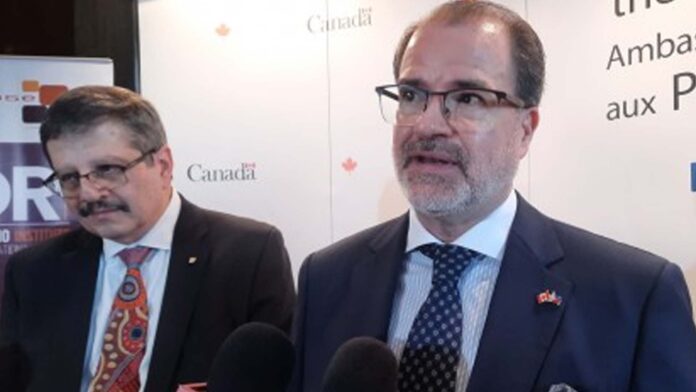The Canadian government is sending a team to the Philippines to discuss ways to boost defense cooperation as it anticipates to sign a new deal.
Canadian Ambassador to the Philippines David Hartman did not provide more details but said the officials would arrive within the week.
Last year Hartman said Ottawa and Manila are hoping to sign a memorandum of understanding (MOU) on defense cooperation by January 2024, a deal that could also open up opportunity for a visiting forces agreement between the two states.
“Very soon (we’ll sign the MOU), we have colleagues coming from Canada this week, we’re waiting to receive a little bit of final direction from our Ministry of National Defense,” he told reporters on Tuesday.
Speaking on the sidelines of a Stratbase ADR Institute conference in Makati City, Hartman said the MOU would also serve as a “facilitative mechanism” to allow both countries to scope out potential opportunities to cooperate on cybersecurity.
“From the military-to-military perspective, that would be an area where there would be a potential cooperation but we want to go beyond that,” he said.
Strengthened cybersecurity
Beyond the military, Hartman said Canada wanted to expand this area of cooperation with other stakeholders, citing the prevalence of cyber threats directed against other sectors.
He said they can provide solutions and help the Philippines as a whole build its capacity, banking on Canada’s “world class information communication technology ecosystem”.
“Now, more than ever, with the growing threat from the proliferation of emerging technologies such as artificial intelligence and quantum computing, likeminded countries must work together to build a resilient and adaptable cyber workforce for the future; indeed, one trained and ready for the whatever the future may hold,” he said.
“It is in this light that Canada is prepared to work hand-in-hand with the Philippines to build this capacity together,” he added.
Meanwhile, Canadian Centre for Cyber Security Head Sami Khoury agreed that the world faces various cyberthreats that necessitate a “whole-of-society” approach and closer collaboration between countries.
Some of the threats, he said, were misinformation, disinformation, data leakage down to cyberespionage.
“The threats that we see are the same threats that we see here so it’s a whole-of-society– we need to invest in not only making the government more resilient but also in the private sector and the civil society,” he said.
“Because we live in a connected world, everything has to be factored in to those all investments,” he said.
Department of National Defense (DND) Secretary Gilberto Teodoro Jr., meanwhile, said the agency is undertaking a transition to stricter operational security and exploring ways to enhance cybersecurity infrastructure and processes.
He said the Philippine government’s process models advanced openness, transparency and competitiveness, especially in acquisitions, could be “anathema to actual realities of cybersecurity, even in cooperation.”
“Naturally, cooperation in cybersecurity entails a critical political analysis of your foreign partners, like-minded nations, treaty partners. Your friend today could be an adversary tomorrow in different aspects,” Teodoro said during Tuesday’s “Fortifying Cyber Cooperation Towards Digital Security” forum organized by Stratbase ADR Institute.
Due to vulnerabilities in cyberspace, he said, the DND is transitioning into stricter operational security, which “starts from individual security, facility security, to digital hygiene, to the architecture that we’re going to put into our systems.”
“So we have to start from base zero. We have had a gap analysis, and there’s a lot to do. We have to put in the right infrastructure, architecture, hardware, software, protocols, and hygiene,” Teodoro said.
“Secondly, contrary to government rules of just-in-time, inventory, etc., we will be building in redundancy, taking into account vendor reliability or servicing reliability,” he added.
Citing national security as a paramount concern, the DND chief underscored the need to create government standards for accountability and prevention rules and regulations to avoid abuse.
Teodoro also urged the academe to spur further research and development, in consonance with President Ferdinand R. Marcos Jr.’s instruction to utilize the vast potential of the country for the provision of revenue, security and employment to all Filipinos.
“We know that the Philippines now, as Ambassador (David) Hartman said, is patient zero for vulnerability. This gives us room for working and cooperating with like-minded partners, creating the proper frameworks and operational and institutional arrangements for long-term cooperation, with the Philippines’ interests in mind, and respecting those of like-minded nations,” he added. (PNA)






